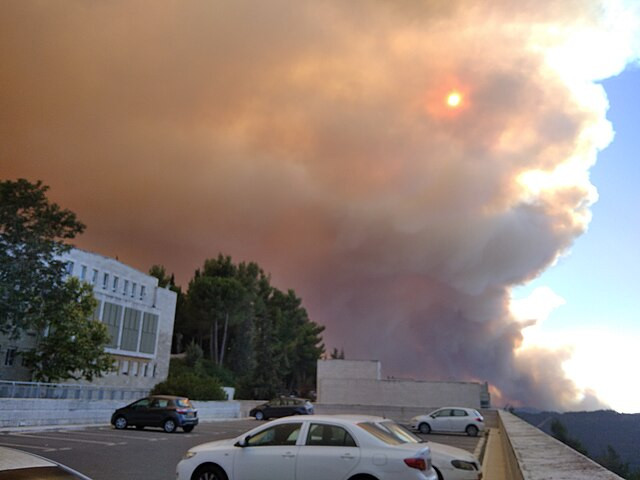Israel declared a national emergency Thursday as wildfires swept through forested hills near Jerusalem, forcing evacuations, halting Independence Day celebrations, and drawing firefighting assistance from multiple European nations. Prime Minister Benjamin Netanyahu confirmed the declaration after fires ignited Wednesday along Route 1, the country's main artery linking Tel Aviv and Jerusalem, prompting authorities to close the highway and evacuate thousands.
Hundreds of residents living about 30 kilometers west of Jerusalem were forced to flee, while thick smoke disrupted live programming at Channel 12, Israel's most-watched television network. At least 23 people, including 17 firefighters, were treated for injuries, mostly due to smoke inhalation and burns, according to Magen David Adom, Israel's national medical emergency service.
The Israel Fire and Rescue Services reported 163 ground teams and 12 aircraft were engaged in battling the blaze. "A very large wildfire, maybe the largest there has ever been in this country," said Shmulik Friedman, Jerusalem district fire commander. The Israeli Air Force has deployed aircraft to drop fire retardants, while engineering vehicles have been dispatched to create firebreaks and prevent the flames from spreading further into forests.
Military assistance was also mobilized. "Overnight dozens of engineering vehicles started operating throughout the country to form lines to prevent the fire from spreading into other trees," the Israel Defense Forces said. Meanwhile, foreign aid began to arrive. Italy, Croatia, Spain, France, and Romania have dispatched firefighting aircraft, with additional support expected from North Macedonia and Cyprus.
The fires broke out on the eve of Israel's Independence Day, causing widespread cancellations of ceremonies, including the flagship torch-lighting event. President Isaac Herzog said during a scaled-back ceremony that the blazes were "part of a climate crisis that we must not ignore."
The Times of Israel described the mood as "a surreal, fraught evening in which Israel is starting to mark its 77th Independence Day while firefighters battle some of the worst wildfires in its history." High winds and dry conditions contributed to the rapid spread, though conditions slightly improved Thursday with lighter wind and brief rainfall.
Television footage showed scenes of chaos on Route 1, with people abandoning vehicles as flames and smoke surged across the hillsides. By Thursday morning, the highway had reopened, revealing scorched brush and trees dusted in pink fire retardant.
Public frustration with the emergency response grew, as some residents claimed the country was unprepared. "It's just very sad because we knew the weather, we kind of knew that would happen, and still we feel like they weren't ready enough with the big planes that can drop large amounts of water," said Yuval Aharoni, a resident near the city of Modiin.
National Security Minister Itamar Ben-Gvir hinted that the fires may have been the result of arson, though no evidence has been presented. Political tensions remain high following weeks of protests and a public spat between Netanyahu and Shin Bet security chief Ronen Bar, further complicating the government's crisis response.
In 2010, a deadly fire on Mount Carmel burned for four days and killed 44 people. The current wildfires, while less deadly, have reignited concerns about preparedness and climate-related risks facing the country.






